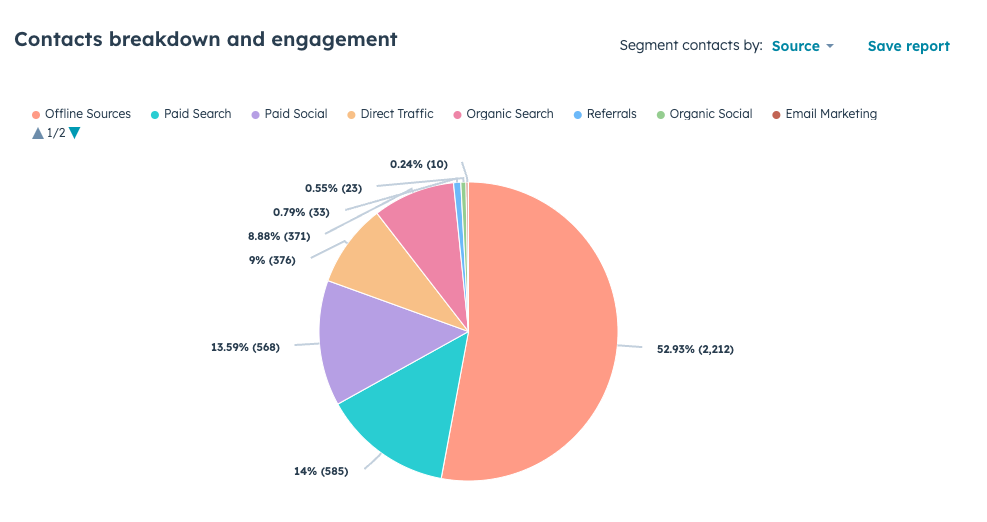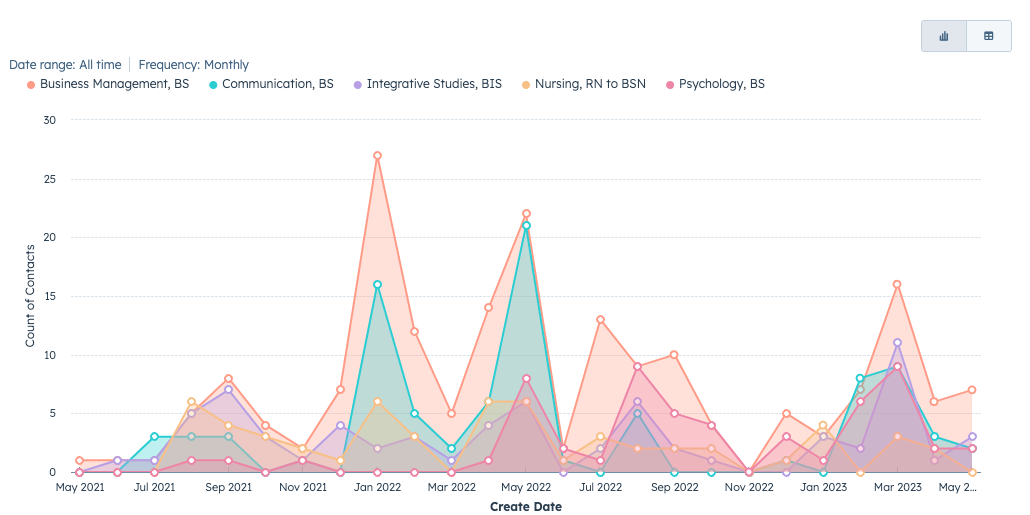The Enrollment Marketer
How to Build an Enrollment Marketing Strategy

June 02, 2023

Any professional who has been in enrollment marketing, particularly higher education enrollment marketing, understands that crafting marketing strategies to increase student enrollment takes time and fortitude.
You might be asking: Why fortitude? Isn’t effort enough?
More often than not, in my 20-year higher education career, I have seen effective enrollment marketing strategies get put on the proverbial back-burner to be replaced by the urgent or trendy. It’s not for lack of desire—it’s for lack of focus. Fortitude is required to put other items aside (just for a bit) in order to give yourself time, data, and license to think creatively in order to craft an enrollment marketing strategy, rather than just adding tactics.
In this article, we’ll take a no-frills approach to building an enrollment marketing plan so that your marketing strategies to increase student enrollment can be listed among your TOP priorities in the coming cycle.
WHY YOU NEED ENROLLMENT MARKETING STRATEGIES MORE THAN EVER
If you’re asking yourself “why”, that is great—we should always Start With Why (props to Simon Sinek). In the past decade, the forces of budget cuts, technology, lacking human commitment, and the overall economic landscape have made enrollment marketing harder than ever. Combine this with the reality that there are fewer students who take a generally less favorable view of the value of higher education and, well, it’s the perfect storm of challenges for college enrollment marketing.
But beyond the philosophical and economic variables of the higher ed landscape, there are two much more practical realities to be wrestled with.
First, the historic methods of enrollment marketing that many institutions are still wedded to are FAR less effective than they used to be. The prospective audience – the group of prospects that is on the receiving end of your enrollment marketing plan – is composed of much more sophisticated buyers. They have engagement and experience expectations from your enrollment marketing materials that are non-negotiable. If your pictures are crappy, if your website is slow, if your architecture isn’t intuitive… well, they move on.
The second practical reason why enrollment marketing strategies are needed is Return on Investment or ROI. Enrollment marketing best practices from 5 or 10 years ago aren’t the same as they are today. Traditional marketing is expensive, it’s hard to track, and it doesn’t scale with the enrollment marketing needs that many institutions require to stay salient. In a word, historic marketing strategies to increase student enrollment lack data, making it very difficult to separate that which worked from other noise!

Getting an Enrollment Marketing Plan Off the Ground
Time (or lack thereof) is one of the critical blockers to this process. Pro-tip: make sure you block out some time on your calendar - either by yourself or with your team - to really work through this process.
In true 7 Habits fashion, you should begin with the end in mind. Understand what you are aiming at before you get into the tactical analysis or adjustments to your enrollment marketing plan. Here are a few goals that are worth considering - beyond the more obvious pursuit of marketing strategies to increase student enrollment:
- Boosting enrollment diversity
- Expanding brand and market reach (e.g. regional, national, international)
- Generating demand or interest for isolated priority programs
- Augmenting personalization in your enrollment marketing
- Fostering more seamless marketing integration
Once the precise college enrollment marketing goals are determined, it’s time to audit the ‘as-is’ state of your enrollment marketing - including the channels that you are using (or over-using) and any tactics that you have not been using but might need to implement.
There are a few different ways to do this - and it will depend on the level of sophistication in the tech stack that the institution uses and/or the outreach patterns that you have established.
One of my favorite recommendations (especially for kinesthetic learner types or for a team) is to get a few different colors of Post-it notes and reserve a room that has a big whiteboard or empty wall. Create the different stages of the funnel with vertical lines or sections of the board. Now, using different colors for different channels (e.g. blue is an SMS text, yellow is an email, pink is direct mail, etc), replicate the activity that occurs at each stage of the funnel. Don’t forget to indicate the timing on the activity.
In a less visually satisfying (and far less fun) way, this can also be done in a slide deck or even a simple document 🥱
Once this is done, do two things:
- Step back so you can really see (in living color) where the over or under-use of channels is happening. Email is USUALLY used in abundance and some channels might be altogether missing from your enrollment marketing plan at select funnel stages.
- Invite a few others to look at it and provide you with their observations. It’s critical to remember that a higher education enrollment marketing plan will demonstrate different strengths and weaknesses to different users - so get the opinions of those who might be characterized as “like your audience.”
Along with the tactical or channel audit, enrollment marketing strategies must keep in mind the results of the effort. It’s important to look at funnel and/or conversion data in tandem with the channel audit in order to determine where your efforts are falling short and what areas need to be prioritized.

ITERATING A NEW HIGHER EDUCATION ENROLLMENT MARKETING PLAN
Adapting new marketing strategies to increase student enrollment won’t happen overnight. It’s better to begin with straightforward recommendations that will mitigate the biggest and most immediate enrollment marketing needs.
The alternative to this is attempting to address too many items at one time, only to flame out in 4 months or, worse yet, not get any approval to change! KEEP IT SIMPLE: Start by making a reasonable list of adjustments & improvements; here are a few more ideas to spur your thinking:
→ Enrollment Marketing Software
Look at the tools that you are using to deploy your enrollment marketing strategies. Does your current enrollment marketing best practice include a robust marketing CRM that provides full-funnel attribution data? Can you easily see campaign efforts and understand ROI results in easy-to-read dashboards? If not, it might be time to implement this kind of tool into your enrollment marketing tech stack.
→ Focus on Student Experience
Are the student experiences that your institution offers—either visits or experiences with your communication flow—the same as they were in 1997? Are you frequently hearing from current students (former prospects) that they got (or are still getting) too much email? Insights like this should inform the marketing strategies for school enrollment that you prioritize.
→ Audit Resource Materials
Don’t forget to also take a comprehensive look at your available resources. If the current admissions and marketing teams have no time, this should be investigated…
- What daily items are stealing their time?
- What are they doing that doesn't yield results?
- What are they not doing that would likely yield more results?
Once you have looked at all of this, make sure that you are NOT introducing enrollment marketing strategies that can’t be supported by the available resources.
Remember, an enrollment marketing plan that is built for today’s world MUST include more automation, more personalization (including responding to prospect engagement), strategic channel diversification (eh, em - the ones that really work), and more ways to measure! If you do this in your updated enrollment marketing plan, your institution will be implementing enrollment marketing best practices and the new and improved enrollment marketing plan should lead to more qualified leads (e.g. more efficient for your staff) and increased student enrollment (e.g. more funding for further improvements later on).
Download DD Agency’s Enrollment Marketing Benchmark Report.
Learn best practices in marketing campaigns to recruit students.
MEASURE YOUR ENROLLMENT MARKETING EFFORTS EVERY YEAR
Since the “as-is” state of your enrollment marketing plan has been audited, the new strategies to increase student enrollment have been laid out, and the new plan now included enrollment marketing best practices - it’s now time to watch it work. But, don’t relax for too long - because measuring the ROI of the enrollment marketing strategies and tactics is a critical step that can NEVER be overlooked.
College enrollment marketing admittedly only has a few times that allow for the strategic measurement of efforts (e.g. the app close date for undergrad only happens once or twice a year). However, don’t feel like those “big timestamps” are the only ones to be measured and/or improved upon. Granted, these are the dates that are big for the marketing strategies to increase student enrollment, but there are plenty of other efforts that can be looked at throughout the cycle.
Think about the overall enrollment marketing plan in smaller segments. This might be graduate enrollment marketing efforts - including webinar or info session pushes or it might be more nuanced like looking at an application push on Instagram or a first-generation campaign on YouTube for your undergraduate enrollment marketing. Regardless of how your institutional enrollment marketing strategy is built, there are ALWAYS ways to look at tactics on a more granular level and make adjustments to improve future results and/or better allocate the resources that are available.
PRO TIP: take as much opportunity as is available to measure
effectiveness and make incremental improvements throughout the cycle.
As a veteran higher education enrollment marketing professional, I can tell you, there will always be something else to do.
Some higher ed admissions and marketing professionals avoid enrollment marketing strategy sessions because of fear, some because of shame, some avoid because they don’t know a better way - which is often linked to not asking the right questions or having access to the right data.
Regardless of where you are and which of the above best describes your current state, getting an enrollment marketing strategy in place that follows today’s enrollment marketing best practices is critical. Don’t let the current season pass by without taking a look at your school’s marketing ideas to help increase enrollment. You’ll be glad you did.
You can also book time on my calendar anytime and we can talk about building an enrollment marketing strategy at your school. Every institution is unique, but here at DD Agency we love a challenge and building custom game plans for each of our Higher Ed clients.
.jpg?width=286&height=190&name=sam%20and%20matt%20(1).jpg) EBOOK
EBOOK
See how schools are using HubSpot for their enrollment marketing
Service Categories: Enrollment Marketing, Inbound Marketing








.png)